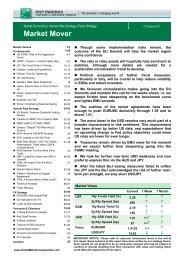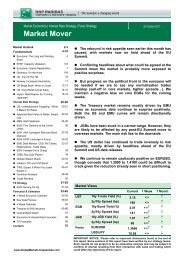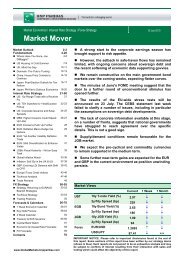Market Economics | Interest Rate Strategy - BNP PARIBAS ...
Market Economics | Interest Rate Strategy - BNP PARIBAS ...
Market Economics | Interest Rate Strategy - BNP PARIBAS ...
You also want an ePaper? Increase the reach of your titles
YUMPU automatically turns print PDFs into web optimized ePapers that Google loves.
The European Commission’s measure of consumer<br />
sentiment in Germany, meanwhile, has risen to its<br />
highest level ever. The equivalent survey for the<br />
eurozone as a whole is only marginally above its<br />
historical average and has stalled in recent months,<br />
at the same time as the survey for Germany has<br />
powered ahead.<br />
The differentials between the German and eurozone<br />
consumer sentiment surveys are at, or near to, their<br />
record highs across a range of the sub-components<br />
compiled by the European Commission. Looking<br />
specifically at consumers’ opinions on the general<br />
economic outlook, the German survey has surged to<br />
its highest ever level, with the gap to the equivalent<br />
survey for the eurozone at about thirty points, a<br />
record high by a huge margin (Chart 6).<br />
The EC survey of consumers’ assessment of the<br />
financial outlook also shows the differential relative to<br />
the eurozone at an all-time high in Germany’s favour.<br />
This reinforces the point made earlier that not only do<br />
German consumers feel that the economy is doing<br />
exceptionally well, they also feel more confident that<br />
they will benefit from the improvement, much more<br />
than they did in the prior upswing. This is positive<br />
from the perspective of the consumer contribution to<br />
future growth.<br />
This is not the case elsewhere. Despite the pick-up in<br />
economic conditions in the eurozone since spring<br />
2009, the purchasing intentions survey compiled by<br />
the EC has been close to its record lows. The<br />
equivalent survey in Germany has been increasingly<br />
steadily. The differential between the two is, like the<br />
rest of the sub-surveys, at an all-time high currently,<br />
having turned positive in Germany’s favour last year<br />
for the first time in its history.<br />
Confirmation required<br />
There is a caveat with the survey data. Though the<br />
figures are remarkably strong, they have often been<br />
a poor guide to spending trends in the past. This is<br />
illustrated in the dynamic correlation analysis in the<br />
article Germany: Consumer Clues in the <strong>Market</strong><br />
Mover of 4 November 2010. Even the highest of the<br />
correlations are not that impressive.<br />
Most consumer sentiment surveys in Germany have<br />
persistently over-predicted consumption growth since<br />
the upturn in the economy began in spring 2009, as<br />
they did in the last expansion. But this time should be<br />
different.<br />
The unemployment rate is near 20-year lows, wage<br />
growth is likely to pick up and monetary policy<br />
conditions are very loose. The longer the German<br />
economy does well, the higher the likelihood of a rise<br />
in permanent income expectations in the household<br />
30<br />
25<br />
20<br />
15<br />
10<br />
5<br />
0<br />
-5<br />
-10<br />
-15<br />
-20<br />
Chart 6: Consumer Sentiment<br />
EC Consumer Survey:<br />
Economic Outlook<br />
86 88 90 92 94 96 98 00 02 04 06 08 10<br />
Source: Reuters EcoWin Pro<br />
Germany less Eurozone<br />
sector in Germany and, in turn, the higher will be the<br />
probability of a change in attitudes to spending and<br />
saving. This may not be immediate but a combination<br />
of very loose monetary policy, strength in the labour<br />
market and record-high confidence right across the<br />
economy must surely have an effect over time.<br />
Our feeling is that the circumstances in Germany<br />
were very much moving in this direction during the<br />
prior expansion, only to be brought to a shuddering<br />
halt by the massive fall-out from the financial crisis.<br />
This hit the German economy especially hard given<br />
its unusually high export-to-GDP ratio and sensitivity<br />
to global trade.<br />
There is considerable potential for a larger growth<br />
contribution in Germany from private consumption<br />
given that it accounts for a relatively low share of<br />
GDP – 56% as of Q3 2010 on a constant price basis.<br />
Our forecasts for stronger spending growth in coming<br />
years are based mainly on our prediction of higher<br />
household real income growth. A sustained shift<br />
down in the savings rate, which is relatively high in<br />
Germany, is an additional source of upward risk to<br />
our growth forecast.<br />
In perspective<br />
Note that, despite the recovery, levels of output in<br />
Germany remain below their pre-crisis peaks. On the<br />
basis of our revised forecasts, we now expect GDP<br />
on a constant price basis to surpass its pre-crisis<br />
peak level (set in Q1 2008) in Q2 2011.<br />
We end with a warning about cold weather-related<br />
complications with the data around the turn of the<br />
year. This regularly plays havoc with the data flow in<br />
Germany, leading to confusion over the underlying<br />
state of the economy. Extreme cold in December last<br />
year has already seen unemployment unexpectedly<br />
rise. But this is merely a temporary disruption. Any<br />
data weakness near-term should be followed by a<br />
compensating rebound thereafter.<br />
Ken Wattret 13 January 2011<br />
<strong>Market</strong> Mover<br />
12<br />
www.Global<strong>Market</strong>s.bnpparibas.com

















